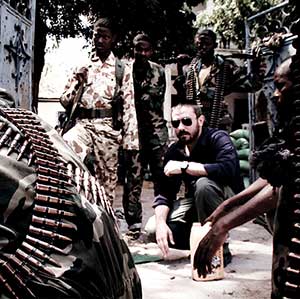

Yes, Dirty Wars evinces the problems of the political documentary writ large, but the film is essential viewing. It’s a supplement, as much as a digest, to journalist Jeremy Scahill’s far more worthwhile book of the same name, chronicling the follies of the ruinous war on terror.
The film has a travelogue side. We visit the actual moonscapes, from Afghanistan to Yemen, where we’re sending expensive military hardware and expeditions to blow up shepherds, farmers, their wives and their pregnant daughters.
Scahill’s beat is the ever-escalating war on terror, which is going underground under Obama. Our troops are coming home, but we’re hiring proxy armies and playing drone-powered whack-a-mole. The lethal strikes kill some radicals but also radicalize survivors when they hit the wrong people.
Our electorate may not be able to find Mogadishu or Sana’a on a map, but the Obama administration’s decision to take the war to American citizens ought to be as alarming as the NSA scandals. And this decision deserves far more attention than the hubbub over the IRS doing its job.
Dirty Wars is at its best at analyzing the dark-siding of the war. Take the 2010 Gardez night raid in Afghanistan that took out a policeman on our side and left half of his family dead. The raid was first branded a Taliban assassination. Then it was revealed by Scahill as the work of a secret strike force within the military: the Joint Special Operations Command (JSOC). The blunder led to a visit by Admiral William McRaven, the mystery man in JSOC; the admiral personally escorted a sacrificial sheep to the survivors as a ritual apology.
Scahill interviews children who survived a targeted missile strike on al-Majalah in 2009. One hopes this movie will make that desert in Yemen a watchword of why these policies must end.
The Tomahawk missile in Yemen was apparently meant for an American citizen: a fanatic named Anwar al-Awlaki, who eventually got the martyrdom he was ready for, although the tale gets worse when Awlaki’s underage son Abdulrahman gets involved. Scahill argues that al-Awlaki, originally a conservative moderate who preached against jihad, became radicalized after 17 months in Yemen on behalf of our government’s own lettre de cachet. Somehow, the experience failed to make al-Awlaki shut up and enjoy his freedom.
Some believe that death is a fit punishment for the American cranks and hotheaded students who decide to go overseas and use their oratory for medievalism. What marginalizes Scahill (even if he gets a seat on the talk shows sometimes) is that he tries to guess what’s troubling the terrorists: incidents like George W. Bush’s brilliant slip of the tongue describing the fight as “a crusade,” as well as the manifold policy failures, examples of torture, mistakes and endless jail.
Making the jump from longtime war correspondent to oncamera figure, Scahill is seen trying to convey to us how he felt uncovering the tragedy—and the whole damn thing is sad enough without the Kronos Quartet making it sadder with their strings on the soundtrack. Dirty Wars styles itself as a film noir, with narration about the danger of what we’re seeing and with shots of Scahill supposedly putting photos on thumbtacks into a wall in his office in Brooklyn to demonstrate his process.
I don’t think it works, visually. Still, Scahill is a brave, dogged reporter, and he deserves to flaunt his angst. Critics have moaned over scenes of the journalist shopping at a Brooklyn bodega, but it seems justifiable as a kind of low-budget salute to the famous big-box-store scene at the end of The Hurt Locker.
All of the cultural indices that supposedly prove the decline from republic to empire (gay marriage, childhood obesity, etc.) are less meaningful than one thing: the loss of the essential, jealously guarded right of citizenship—the right to trial, the right not to be put to death without explanation. That’s the essence of Scahill’s argument in Dirty Wars, and that’s what protects the documentary from visual or narrative hyperbole and that groaning bull-fiddle on the soundtrack.
90 MIN, NR



